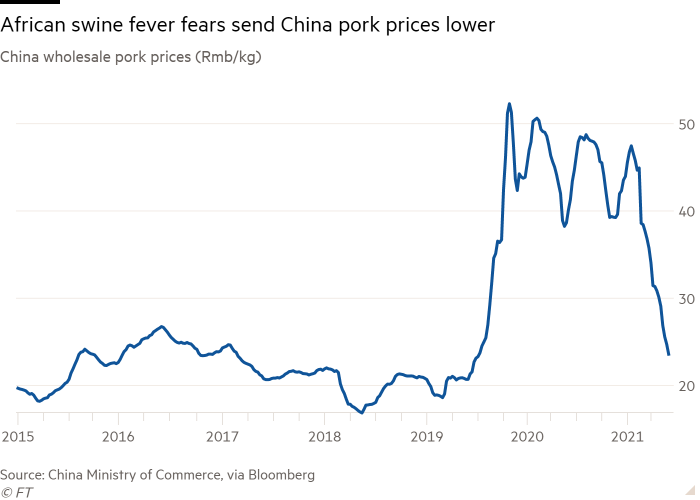[ad_1]
Hog futures in China have fallen to record lows as mass slaughtering of pigs prompts fears that the world’s second-biggest economy faces a deluge of pork.
Rising concerns that the local market is becoming inundated with the meat have led to a more than 30 per cent fall in Dalian-traded hog futures, which allow investors to bet on the future direction of prices, since they were launched in January.
The situation contrasts with that in the world’s biggest producer, consumer and importer of pork over much of the last two years when outbreaks of African Swine Fever resulted in price surges due to fears of supply shortfalls.
Prices have been hit as authorities have encouraged farmers to raise more pigs and replenish the country’s pork reserves following outbreaks of ASF.
Analysts say that the situation has been made worse by farmers, concerned that prices will fall further, bringing forward plans to cull their herds. Oversupply worries have also been stoked by some farmers fattening their sows to weights up to 300-400kg — comparable with some polar bears — versus their usual 200kg, according to Chinese media reports.
On Tuesday, hog futures on the Dalian Commodity Exchange dropped as much as 7.1 per cent to a trough of Rmb18,550 ($2,900) per metric tonne after it was reported that smaller pigs were also being slaughtered, adding even more supply.
Wholesale pork prices in China have dropped almost 50 per cent this year to Rmb23.57 per kilogramme, their lowest price since late 2019.
“It’s definitely surprising how fast and far pork prices have fallen,†said Darin Friedrichs, an analyst at commodities broker StoneX Group in Shanghai.

China has struggled to get a grip on pork price fluctuations since ASF began tearing through the country’s hog herds in 2018.
Analysts said the latest drop in futures prices was partly a response to a report issued by Beijing’s Xinfadi Market, a large wholesale market in the capital, on Friday that noted that smaller pigs were being brought to market.
This “indicates some farms have significantly lowered their expectations for future meat prices and . . . are slaughtering ahead of scheduleâ€, according to the report.
The latest price swings prompted China’s cabinet, the National Development and Reform Commission, to publish a policy statement last week promising to “maintain supply and stabilise prices in the pork marketâ€, without specifying what the measures were.
Pork prices are a significant component in China’s consumer price index, and their volatility has been a driver of its performance over the past year. Falling pork prices late last year helped push inflation into negative territory for the first time in over a decade.
Friedrichs, at StoneX, said policymakers had hoped the introduction of futures contracts would help smooth out boom and bust cycles in Chinese pork prices.
“Now we’re in a bust cycle, so the volatility is still there,†he said.
[ad_2]
Source link






